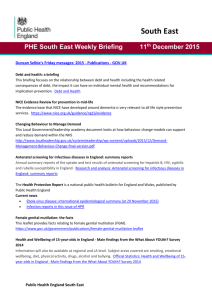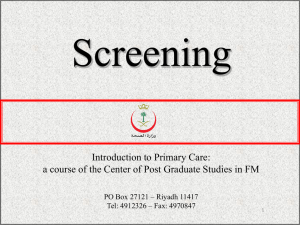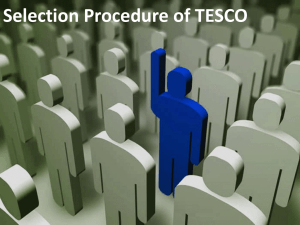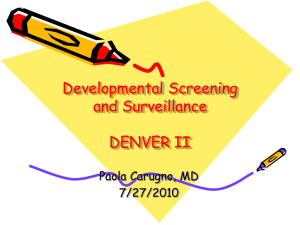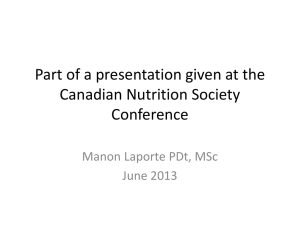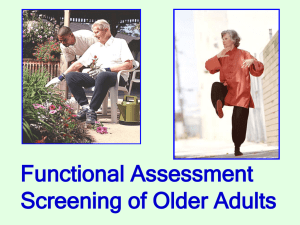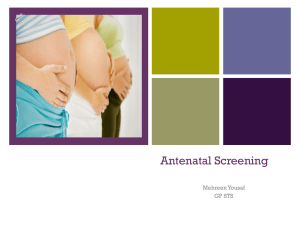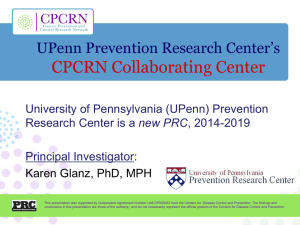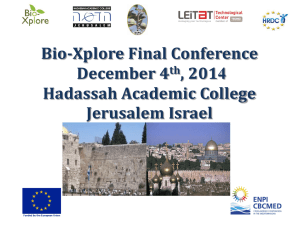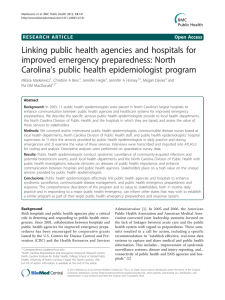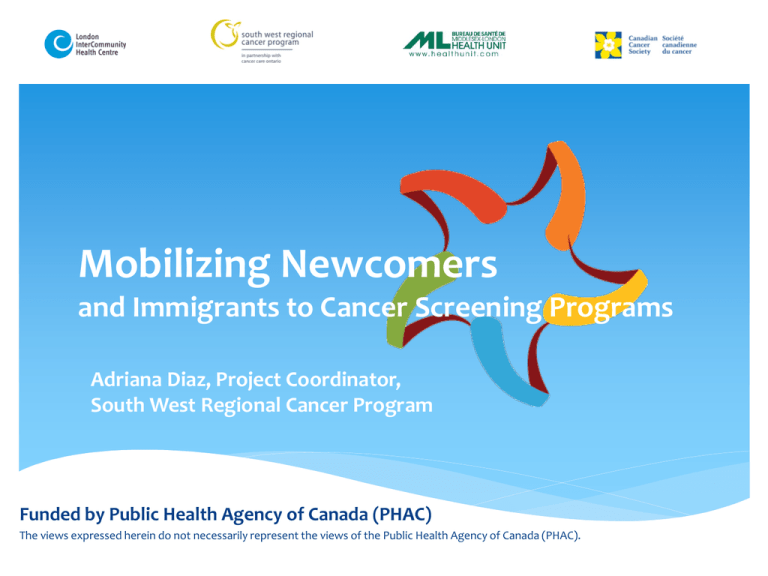
Mobilizing Newcomers
and Immigrants to Cancer Screening Programs
Adriana Diaz, Project Coordinator,
South West Regional Cancer Program
Funded by Public Health Agency of Canada (PHAC)
The views expressed herein do not necessarily represent the views of the Public Health Agency of Canada (PHAC).
Why Do This Project?
Newcomer/Immigrant populations
Less likely to participate in cancer screening
Have later-stage cancer diagnosis (sometimes
present at stage of entry
And as a result
More likely to experience unfavorable
outcomes from the disease
Project Goal
Develop, deliver and evaluate evidence-based cancer
prevention and screening service delivery model
Targeted to newcomer and immigrant under/never
screened populations in London, Ontario
Disseminate across Canada
Project Deliverables
Reduce barriers that limit access to cancer
prevention/screening information and cancer
screening programs
Increase awareness about cancer prevention and
screening
Project Deliverables
Improve cultural safety of immigrant and
newcomer cancer care experience
Promote participation of immigrants and
newcomers in cancer screening and early
detection
Project Structure
PHAC
SWRCP
Advisory
Committee
Members
CCS
LIHC
MLHU
Project
Coordinator
Focus Group
Facilitators
Iraqi
PHE(2)
SWRCP
Admin Assistant
Evaluator Consultant
Arabic
PHE (2)
Spanish
PHE (2)
Nepalese
PHE (2)
Target
population
Immigrant
communities
Arabic
Spanish
Iraqi
Health Providers
Nepalese
Middlesex
London Health
Unit
PCP, Nurse
practitioners and
PCP office staff
OBSP
LRCP
Peer Health Educator (PHE) Model
PHEs “represent the intersection between risk and
resilience, between institution and community, and
between research and practice” (Landers & Stover, 2011,
p.2198)
The Institute of Medicine (2002) recommended that
PHEs be included on multidisciplinary health care
teams to address issues in serving racial and ethnic
populations that face chronic barriers in accessing the
health care system
Peer Health Educator (PHE) Model
Roles:
preventative and health education
interactions with other Health Human Resource (HHR)
Research and health system access and navigation
PHEs have strong ties, based on trust, respect, and
mutual understanding, with the communities they serve
PHEs understand the needs of their communities,
mainly because they have lived and experienced those
needs
Peer Health Educator Training
Phased Approach to Material
Development
Phased Approach to Material
Development
Community
Evidence-Based Barrier
Language
“There are many brochures but they do not answer my
questions. In our Latino culture we are more personal. I
would like the information in person where I could ask
in my own language. We do not want to read those and
then look on websites or call that number”
Spanish Participant
Community
Evidence-Based Barrier
Knowledge
“If I have an abnormal pap test or if I have cervical
cancer, my husband should leave me…I would be
disowned by my husband. I will not go… I have 4 kids”
Arabic participant
“Why does the doctor ask if I have relatives with cancer?
Is it because it is contagious? Could I infect others?”
Nepalese participant
Community
Evidence-based Barrier
Accessibility
“My mom had a medical appointment, so I had to go
with her to be an interpreter. When we were in, I asked
for a breast screening test – a mammogram – for my
mom…
…the answer was you need to book another
appointment to talk about it. I do not have time and get
permission…it is not easy… it is another barrier.”
Spanish participant
Phased Approach to Material
Development
Mobilizing Newcomers and
Immigrants to Cancer Screening Programs
Cultural differences among target
populations necessitates
Customized presentations
Next Steps
Develop test
materials
Evaluate and
Refine
Deliver KTE
Focus test
materials
Review &
Revise
Phased Approach to Material
Development
Workshops
Delivered by PHEs in their
language
Child care offered and
refreshments
Culturally-relevant/community
locations
Workshops
Reducing cancer risk (healthy
living)
Breast, cervical and colorectal
cancer screening programs
Workshops
Video – sharing personal
experience in cancer screening
“How to reduce your risk” form
Booking mammogram and pap
test appointments and arranging
– “community appointments”
Learning Points
Peer Health Educators
‐ Approach communities in a culturally sensitive
manner
‐ Build trust in communities
‐ Deliver information in own language
‐ Deliver information with understanding of
culture, traditions and behaviors
‐ Find the right location
Learning Points
Use healthy living examples to help overcome fear
and anxiety of cancer
Immigrant communities participate in cancer
screening programs when the purpose, access to
programs, and procedures are understood
Health Care Providers – Cultural
Competency Workshops
ABCDE Model for Cultural
Competency
Acknowledgements to SickKids
Hospital in Toronto
Grand Rounds LRCP (1) and Evening Workshops (2)
Dr. Bhooma Bhayana, Schulich School of Medicine and Dentistry
Dr. Jan Owen, Primary Care Lead, Southwest Regional Cancer
Program
Dr. Adriana Diaz, Project Coordinator
Thank you

